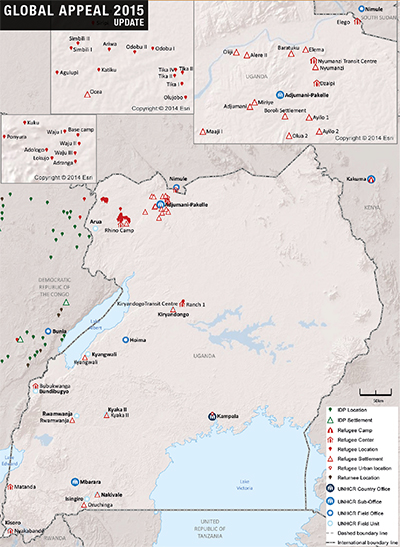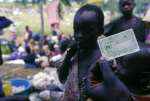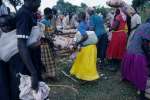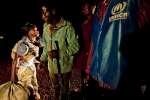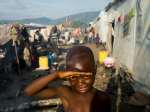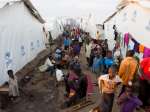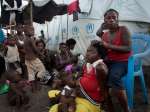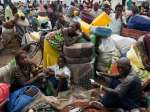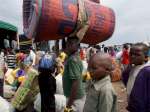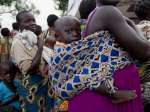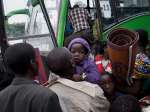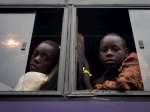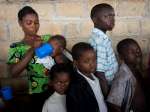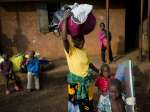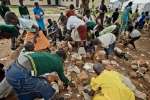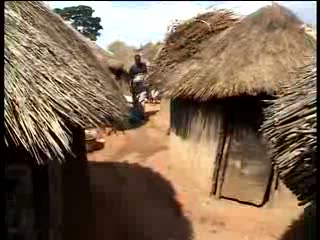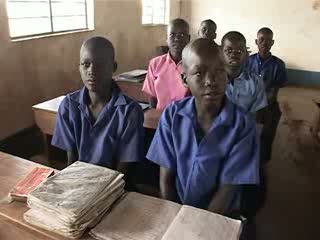Home > Where We Work > Africa > East and Horn of Africa > Uganda
2015 UNHCR country operations profile - Uganda
| Overview |
Working environment
-
The traditional hospitality and generous asylum policies of the Ugandan Government were further demonstrated when fighting erupted in South Sudan in December 2013. Given the magnitude of the resulting humanitarian emergency, the Ugandan Government recognized South Sudanese fleeing to Uganda on a prima facie basis, and, in coordination with UNHCR and other partners, mounted one of the country's largest coordinated emergency responses. Nearly 125,000 South Sudanese in Uganda can access life-saving protection and assistance services.
-
Some improvements in security in parts of the eastern Democratic Republic of the Congo (DRC) have led tens of thousands of Congolese refugees to voluntarily repatriate from Uganda, either spontaneously or with humanitarian assistance. This momentum of returns from Uganda to the eastern DRC is expected to continue in 2015 and the Government, UNHCR and its partners will support Congolese who elect to voluntarily repatriate.
-
The Government and host communities allocate land to refugees in designated settlements in Uganda. However, growth in national and refugee populations means that land is becoming scarce and plot sizes are shrinking to accommodate new arrivals. A key 2015 challenge will be to optimize opportunities, productivity and returns from these smaller plots in order to achieve adequate social and economic security for affected households.
-
With UNHCR's support, the Government also: registers and issues civil identity documents to individual refugees; decides on asylum applications and appeals; deploys civil servants, health workers and teachers to refugee settlements; and contributes medical supplies and staff to refugee operations.
-
Regional diplomatic and military efforts to re-establish peace, security and stability, could significantly shape future domestic political and security agendas as well as operational trends. Domestic security risks and priorities likely to result from potential instability in the region may also affect humanitarian access and programme priorities and strategies.
People of concern
The three main population groups of concern to UNHCR in 2015 are projected to be refugees and asylum-seekers from South Sudan, the DRC and Somalia. Nearly two-thirds have arrived within the past five years in successive waves of refugee influxes that followed periods of conflict and insecurity in the respective countries of origin.
| UNHCR 2015 planning figures for Uganda | |||||
|---|---|---|---|---|---|
| Type of population | Origin | January 2015 | December 2015 | ||
| Total in country | Of whom assisted by UNHCR |
Total in country | Of whom assisted by UNHCR |
||
| Total | 536,610 | 536,610 | 692,330 | 692,330 | |
| Refugees | Dem. Rep. of the Congo | 226,880 | 226,880 | 228,400 | 228,400 |
| Somalia | 43,970 | 43,970 | 60,410 | 60,410 | |
| South Sudan | 139,280 | 139,280 | 271,300 | 271,300 | |
| Various | 46,350 | 46,350 | 51,060 | 51,060 | |
| Asylum-seekers | Dem. Rep. of the Congo | 7,840 | 7,840 | 8,110 | 8,110 |
| Eritrea | 4,610 | 4,610 | 4,770 | 4,770 | |
| Somalia | 8,710 | 8,710 | 9,000 | 9,000 | |
| Various | 8,850 | 8,850 | 9,150 | 9,150 | |
| Returnee arrivals during year (ex-refugees) | Uganda | 20 | 20 | 20 | 20 |
| Stateless | Stateless | 100 | 100 | 100 | 100 |
| Others of concern | Uganda | 50,000 | 50,000 | 50,000 | 50,000 |
| Response |
Needs and strategies
In 2015, UNHCR's focus will remain on maintaining robust and effective systems in: inter-agency emergency preparedness, coordination and response capacity in a fluid geopolitical environment; access to asylum, safety, security and international protection; delivery of primary health care; sufficient food and nutrition support, education, clean drinking water, sanitation, hygiene, shelter and other infrastructure; timely provision of core relief items such as soap, jerry cans, blankets and other essential domestic items; targeted interventions for the most vulnerable refugees; and support for opportunities to achieve durable and livelihoods solutions.
Planned multi-year response strategies in international protection, basic service delivery, solutions and capacity building of local service providers, will be strengthened by strategic partnerships to ensure sustainable interventions and outcomes. The Office will work closely with refugees and host communities; governmental, humanitarian and development agencies; and other strategic partners, to achieve objectives set.
The multi-year Refugee and Host Population Empowerment (ReHOPE) strategy, led by UNHCR on behalf of the UN Country Team, plans to support resilience-building efforts targeting refugee-affected districts by implementing a coordinated, multi-sector programme.
The pursuit of a multi-year, comprehensive solutions strategy, particularly for protracted groups, will remain an operational priority in 2015. To improve refugee security management and access to the judicial system, UNHCR will support the deployment of female and male police officers in refugee settlements. This will enhance community policing, as well as strengthen peaceful coexistence among different refugee communities and host communities. The Office will concurrently invest in training and logistical and material support, to advance broader protection goals, including child protection and SGBV prevention and response systems. This will enable effective community-based protection systems and solutions, as well as better relations between the police and communities.
The Government's refugee policy permits freedom of movement and the pursuit of livelihood opportunities. To optimize these opportunities, UNHCR will seek multi-year donor support for coordinated interventions in refugee-hosting areas to help advance prospects for long-staying refugees to acquire an alternative legal residency status.
| Implementation |
Coordination
The Office of the Prime Minister's Refugee Department and UNHCR jointly coordinate responses to address refugees' protection and assistance needs, as well as solutions, both for emergencies and ongoing programmes. This ensures effective consultations and coordinated interventions, supported by more than 60 local and international NGOs, the UN Country Team, humanitarian and development agencies, multilateral institutions, regional bodies and the private sector.
Regular strategic inter-agency coordination takes place at the national and district levels, where there is an increased focus on coordinating targeted and sustainable multi-year protection, basic services and durable solutions' interventions.
| 2015 UNHCR partners in Uganda |
|---|
| Implementing partners |
| Government agencies: District governments of Adjumani, Arua and Kiryandongo, Nsamizi Training Institute for Social Development, Office of the Prime Minister |
| NGOs: Action Africa Help - Uganda, Africa Humanitarian Action, African Initiatives for Relief and Development, American Refugee Committee, Danish Refugee Council, Humanitarian Initiative, InterAid Uganda, Just Relief Aid, Lutheran World Federation, Medical Teams International, Nsamizi Training Institute for Social Development, Oxfam, Pentecostal Church of Uganda, Uganda Red Cross Society, Windle Trust - Uganda |
| Operational partners |
| Government agencies: District Governments of Bundibugyo, Hoima |
| NGOs: Action Against Hunger, Adventist Development and Relief Agency, African Centre for the Treatment and Rehabilitation of Torture Victims, Agency for Cooperation and Research in Development, Alliance2015, Baylor, CARE International, Concern, Caritas, Catholic Relief Services, Finnish Refugee Council, Global Refugee International, GOAL, HelpAge International, Human Rights Network Uganda, Humedica, International Aid Services, International Rescue Committee, Jesuit Refugee Service, Malteser International, Marie Stopes, Médecins Sans Frontières, Norwegian Refugee Council, Oxfam, Public Defenders Association of Uganda, Real Medicine Foundation, Refugee Law Project, Samaritan's Purse, Save the Children, Touch Africa, Transcultural Psychosocial Organisation Uganda, War Child, Welthungerhilfe, World Harvest Mission, World Vision, ZOA |
| Others: FAO, ICRC, IOM, OHCHR, UNAIDS, UNDP, UNFPA, UNICEF, UNV, WFP, WHO |
| Financial information |
Since 2011,emergencies in the region have multiplied the financial requirements of the Uganda operation almost threefold: from USD 76.5 million in 2011 to nearly USD 209.9 million in 2014. This increase has been driven primarily by the growth in needs, owning to the mass influxes into Uganda from neighbouring emergencies.
A supplementary appeal was launched in 2014 to cover the additional needs, and further supplementary requirements may arise in the year to come.
In 2015, the financial requirements for Uganda are set at USD 181.1 million, largely to consolidate and sustain the ongoing humanitarian response.
Source: UNHCR Global Appeal 2015 Update
UNHCR contact information
| The UNHCR Representation in Uganda | |||||||||||||||
|---|---|---|---|---|---|---|---|---|---|---|---|---|---|---|---|
| Style of Address | The UNHCR Representative in Uganda | ||||||||||||||
| Street Address | Plot 11/13, Mackenzie Close, Off Mackenzie Vale, Kololo, Kampala, Uganda | ||||||||||||||
| Mailing Address | P.O. Box 3813, Kampala, Uganda | ||||||||||||||
| Telephone | 41 22 739 75 46 | ||||||||||||||
| Facsimile | 41 22 739 75 47 | ||||||||||||||
| ugaka@unhcr.org | |||||||||||||||
| Time Zone | GMT + 3 | ||||||||||||||
| Working Hours |
|
||||||||||||||
| Public Holidays | 01 January 2015, new year 26 January 2015, liberation day 03 April 2015, good friday 06 April 2015, easter monday 01 May 2015, labour day 17 July 2015, eid el fitr 23 September 2015, eid al adha 09 October 2015, independence day 25 December 2015, christmas 26 December 2015, Boxing day |
||||||||||||||
| Comments | UN Official Holidays in Uganda for 2016 1 January New Years Day 26 January Liberation Day 25 March Good Friday 28 March Easter Monday 1 May Labour Day 6 July Eid Al Fitr 12 September Eid Al Adha 9 October Independence Day 25 December Christmas Day 26 December Boxing Day | ||||||||||||||
| The UNHCR Sub-Office Mbarara | |||||||||||||||
|---|---|---|---|---|---|---|---|---|---|---|---|---|---|---|---|
| Style of Address | The UNHCR Head of Field Office at Mbarara | ||||||||||||||
| Street Address | Plot 4, Karamura Lane, Mbaguta Cell, Ruharo, Mbarara, Uganda | ||||||||||||||
| Mailing Address | P.O. Box 391, Mbarara, Uganda | ||||||||||||||
| Telephone | 41 22 739 75 89 | ||||||||||||||
| Facsimile | 256 414 256 989 | ||||||||||||||
| UGAMB@unhcr.org | |||||||||||||||
| Time Zone | GMT + 3 | ||||||||||||||
| Working Hours |
|
||||||||||||||
| Public Holidays | 01 January 2015, new year 26 January 2015, liberation day 03 April 2015, good friday 06 April 2015, easter monday 01 May 2015, labour day 17 July 2015, eid el fitr 23 September 2015, eid al adha 09 October 2015, independence day 25 December 2015, christmas 26 December 2015, Boxing day |
||||||||||||||
| UNHCR Sub Office Arua, Uganda | |||||||||||||||
|---|---|---|---|---|---|---|---|---|---|---|---|---|---|---|---|
| Style of Address | The Officer-in-Charge of Sub-Office at Arua | ||||||||||||||
| Street Address | Plot 66/67, Weatherhead Park Lane, Arua, Uganda | ||||||||||||||
| Mailing Address | P.O Box 847, Arua, Uganda | ||||||||||||||
| Telephone | 256 476 420 003 | ||||||||||||||
| Facsimile | 256 414 256 989 | ||||||||||||||
| ugaar@unhcr.org | |||||||||||||||
| Time Zone | GMT + 3 | ||||||||||||||
| Working Hours |
|
||||||||||||||
| Public Holidays | 01 January 2015, new year 26 January 2015, liberation day 03 April 2015, good friday 06 April 2015, easter monday 01 May 2015, labour day 17 July 2015, eid el fitr 23 September 2015, eid al adha 09 October 2015, independence day 25 December 2015, christmas 26 December 2015, Boxing day |
||||||||||||||

